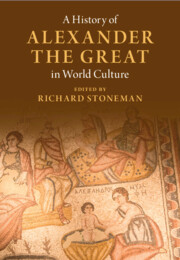Book contents
- A History of Alexander the Great in World Culture
- A History of Alexander the Great in World Culture
- Copyright page
- Contents
- Figures
- Notes on Contributors
- Preface
- Abbreviations
- 1 Introduction
- 2 Alexander and Alexandria in Life and Legend
- 3 The Image of Alexander in Ancient Art
- 4 Alexander, Philosophy and Rome
- 5 Christianising Alexander Traditions in Late Antiquity
- 6 Alexander in Ancient Jewish Literature
- 7 The Medieval Alexander
- 8 Alexander the Great and the Crusades
- 9 The Slavic Alexander
- 10 Alexander the Great in Byzantine Tradition, AD 330–1453
- 11 The Spanish Alexander
- 12 The Persian Alexander (1)
- 13 The Persian Alexander (2)
- 14 Alexander in Medieval Arab Minds
- 15 Alexander in the Age of Shakespeare
- 16 Alexander the Great in Opera
- 17 Alexander in the Long Eighteenth Century (c.1660–1830)
- 18 Images of Alexander in Germany
- 19 Alexander the Gay and the Gloryhole That Was Greece
- Index
- References
15 - Alexander in the Age of Shakespeare
The Monarchicke Tragedies of Sir William Alexander
Published online by Cambridge University Press: 13 January 2022
- A History of Alexander the Great in World Culture
- A History of Alexander the Great in World Culture
- Copyright page
- Contents
- Figures
- Notes on Contributors
- Preface
- Abbreviations
- 1 Introduction
- 2 Alexander and Alexandria in Life and Legend
- 3 The Image of Alexander in Ancient Art
- 4 Alexander, Philosophy and Rome
- 5 Christianising Alexander Traditions in Late Antiquity
- 6 Alexander in Ancient Jewish Literature
- 7 The Medieval Alexander
- 8 Alexander the Great and the Crusades
- 9 The Slavic Alexander
- 10 Alexander the Great in Byzantine Tradition, AD 330–1453
- 11 The Spanish Alexander
- 12 The Persian Alexander (1)
- 13 The Persian Alexander (2)
- 14 Alexander in Medieval Arab Minds
- 15 Alexander in the Age of Shakespeare
- 16 Alexander the Great in Opera
- 17 Alexander in the Long Eighteenth Century (c.1660–1830)
- 18 Images of Alexander in Germany
- 19 Alexander the Gay and the Gloryhole That Was Greece
- Index
- References
Summary
Sir William Alexander’s tragedies on classical themes include two relating to Alexander the Great: one is about the latter’s defeat of Darius III and the other follows the fortunes of the successors after Alexander’s death. (It begins with a long speech by Alexander’s ghost). This chapter aims to combat the prevailing critical contempt for these plays by demonstrating the high level of scholarship that went into their composition and the thematic unity to the Alexandraean Tragedie conferred by the series of chorus meditations on Fortune and mutability. Sir William’s educational background and classical reading are explored, as well as his connections with the stage, and his work is compared with earlier Elizabethan plays on classical themes, including the comparable play by Samuel Daniel, Philotas.
Keywords
- Type
- Chapter
- Information
- A History of Alexander the Great in World Culture , pp. 334 - 349Publisher: Cambridge University PressPrint publication year: 2022



